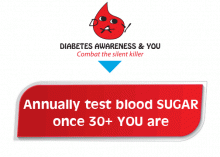
Diabetes Awareness and You (DAY), Kolkata says that food and lifestyle habits play a significant role in the prevalence of diabetes in West Bengal. PatientsEngage talks to DAY on the steps to help manage diabetes especially among women.
What are the challenges of Diabetes Mellitus in WB? Is it different from the rest of the country? (Kolkata has the second highest prevalence rate of diabetes among Indian metros)
The world is moving on the wheels of scientific advancements, adding years to life and promoting demographic transition. Increased connectivity, economic independence and improved acculturation have been changing life style of people across the globe. Rapid urbanisation is also adding to it. These changes are global and affecting both developed and developing countries. Developing countries like India are sitting on two-faced swords of communicable and non-communicable diseases as a result of epidemiological and demographic transitions. Challenges in the management of Diabetes management in West Bengal are at par with the rest of India, and maybe even better at some levels. A few pointers:
- Awareness level of the people as well as the health care provider of various levels are not upto the mark, compounded by the fact that the percentage of patients seeking proper medical treatment for an illness is less than 25 per cent. Rest buy their medicines over the counter.
- The food habit of people of West Bengal is high in glycemic index and predisposes to development of diabetes. For the same reason the food habit leads to poor control of diabetes. It may also have an effect in development of GDM (Gestational Diabetes Mellitus).
- The burden of cost of effective management and monitoring to prevent complications may have escalated with rising health care cost leading to financial stress on patients.
- Ethnicity of Asians and consequently Bengalis, predisposes them to development of diabetes.
- Time bound revisit and monitoring for diabetes almost never happens. People only go to their doctors only if they are ill
Are there differences in diabetes awareness in rural and urban areas? Are there differences in diabetes management by the people - across gender and across rural-urban and age?
Yes, definitely. There is a difference between awareness level of rural and urban people. In general, urban people are more aware on the subject but they also face tempting and easily available fast food like pizza, burger, etc which compromise healthy diet and make people diabetes prone.
There is also some difference in management of diabetes in rural and urban areas. Urban people, having ready and easy access to speciality clinics, receive better management than rural people. In urban areas, gender discrimination is negligible, while there is serious lag in diagnosis and management of females in rural areas.
Middle-aged earning members of the family generally receive better health care than children or older non-earning members of the family. Economic independence is the key to receiving proper treatment. Diabetes management is adversely affected by rural residence due to lack of awareness, lack of trained manpower, poor purchasing power to sustain life long medications.
DAY did a study last year that showed a high percentage of pregnant women having gestational diabetes
a) What is the reason for this?
Reason of high prevalence of GDM in West Bengal may be linked to ethnicity, dietary habits, regular Oral Contraceptive Pill intake, lack of exercise, obesity, high prevalence of Polycystic Ovarian Disease, those who had their mothers having diabetes during pregnancy and lack of proper monitoring and diagnosis of pre-gestational diabetes.
b) What can be done about this?
Routine test for blood sugar after puberty and after marriage and early in the pregnancy period may exclude pre-gestational diabetes and gestational glucose intolerance and eventually GDM. Preconception weight to be controlled with rigorous lifestyle intervention.
Related Reading: Pre-conception care for a healthy pregnancy
What are the barriers for diabetes management based on your experience?
Non-compliance and lack of awareness of the treatment are usually the most important barriers of diabetes management. Lack of awareness regarding the disease process, frequent side effects of improper medications, specially hypoglycaemia, lack of affordability of the newer safer drugs and a fear of the Insulin contribute to the poor compliance. In addition to non-compliance, availability of trained health care professionals is also a major barrier in diabetes management, specially in rural areas and tier 2 cities. Most of the health care set up usually focuses on in patient care which is expensive and usually not required in most of the cases of diabetes management. Lack of immediate serious sign symptoms and complications of diabetes also promotes poor compliance of patients.
What is the advice you will give to someone who has recently been diagnosed?
My advice to a newly diagnosed diabetic will be, fasten your belts because we are in for a long haul. But don't worry, follow your doctor's advice, consult him as he recommends, check your parameters regularly, manage your diet, exercise daily, stop smoking and moderate your alcohol consumption and you will be ok. It is also important to help them understand the idea of “living healthy with diabetes” which can be achieved by healthy life style, team care and good compliance.
What is the tip for someone struggling to manage with medications but reluctant to switch to insulin?
Counselling, counselling and counselling, of the patient and the family as well as friends, at home and at work.
You can't write him or her off and have to continue to persuade him or her on switching to insulin. Usually the greatest barrier is the fear of the needle prick, so a session by a patient who is already taking Insulin and a live demonstration by the physician might just help.
Anything else you would like to share?
That a certain person has diabetes has got nothing to do with his or her worth as a person or his or her working capacity or capabilities. He should not be ostracised from any aspect of life or stigmatised. Indeed a person with diabetes can lead a normal life if he manages properly.
And, that, above all, early diagnosis is the key to successful treatment and disability prevention. So, please remember our slogan, "বয়স হলে ৩০ বছর; ব্লাড সুগার টেস্ট প্রতি বছর"... .”Annually test Blood Sugar , Once 30+ YOU are”
Diabetes Awareness and You (DAY) is headquartered in Kolkata, India, and was founded in 2006 as a social welfare organisation striving to address the issue of lack of awareness of diabetes and also creating provisions for free treatment.







